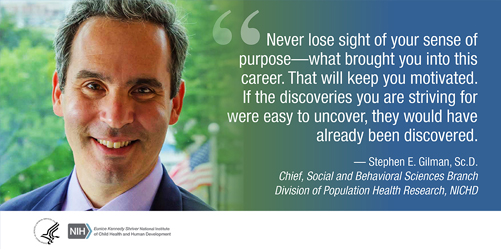 How did you become interested in science and research?
How did you become interested in science and research?
By chance! After college, I was on track for a career in documentary photography, motivated by a passion for social justice. I decided a career in the arts was not for me because I did not want my work to be constantly judged by others. In retrospect, how ironic given that peer review is such a critical part of a career in science! My first post-photography job was as a research assistant in the psychiatry department at Tufts University 
What brought you to NICHD?
Before coming to NICHD in 2015, I was a faculty member at the Harvard T.H. Chan School of Public Health 
What types of training, experiences, or traits are essential for success in your position?
First, a sense of purpose. This has to come from within, but being part of a great team can further inspire that purpose—and inspire that purpose in others. Second, continued learning is critical. This includes staying on top of the emerging science and novel methods. It also includes continued learning on leadership skills, time management, and building interpersonal relationships.
What is your favorite research finding out of everything you have worked on?
I don’t have a single favorite finding! Every finding is unique and loved in its own way. But if you really force me to answer, I would have to say my favorite research is what my team and I are working on right now, pursuing the social determinants of child development and mental health, and we don’t yet know what the findings will be!
What advice can you offer to people who are at an earlier stage of their career?
Never lose sight of your sense of purpose – what brought you into this career. That will keep you motivated. Science is hard. Don’t expect it not to be. If the discoveries you are striving for were easy to uncover, they would have already been discovered. Peer reviews are usually critical. Grant applications are more likely to be rejected than funded. Jobs that you apply to are more likely to say no than yes. Your p-value is more likely to be non-significant than significant. Learn not to take rejection personally. Not a single aspect of the research process is “beneath you”—no matter how many fancy degrees you have. Be an outstanding institutional citizen. And never lose sight of your sense of purpose.
Return to Get to Know NICHD.
 BACK TO TOP
BACK TO TOP